Saturday, July 29, 2006
The "One Book" Meme
1. One book that changed your life: Karl Barth - Church Dogmatics IV/1
2. One book that you've read more than once: Aidan Nichols - The Shape of Catholic Theology
3. One book you’d want on a desert island: The Revised Standard Version with Apocrypha
4. One book that made you laugh: C.S. Lewis - The Great Divorce
5. One book that made you cry: C.S. Lewis - Surprised by Joy
6. One book that you wish had been written: Karl Barth - Church Dogmatics IV/4
7. One book that you wish had never been written: Dom Gregory Dix - The Shape of the Liturgy
8. One book you’re currently reading: John Polikinghorne - Science and Christian Belief
9. One book you’ve been meaning to read: Joseph Farrell - Free Choice in Maximus the Confessor
10. Now tag five people: I'm tagging the following bloggers - Steve Blakemore (Thinking is Good for You), Brett (Pennsylvanian-Anglican), Johnny Drums (Every Square Inch), Acolyte and/or Photius Jones (Energies), and Tommy (Hagia Sapentia).
P.S. - This is harder than it looks!
Top Ten List: Worst Mistakes in Church History
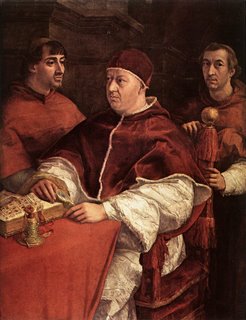
Of course, there are a LOT of mistakes in church history to choose from - perhaps too many for a decent top ten list - but here's a list of my "favorite" worst mistakes:
10. The sale of indulgences (16th century)
9. The “Robber Council” of Constantinople (869)
8. The papal bull Exsurge Domini excommunicating Martin Luther (1520)
7. The condemnation of Jan Hus by the Council of Constance (1411)
6. The Crusader sack of Constantinople (1204)
5. The definition of the Immaculate Conception (1854)
4. The Synod of Toledo (447)
3. The Forging of the Pseudo-Donation of Constantine (8th century)
2. Augustine writes De Trinitate (5th century)
1. Mutual East/West excommunications leading to the Great Schism (1054)
What are some of your favorites?
P.S. - Pope Leo X features twice in this list, so I included a portrait of him.
Wednesday, July 26, 2006
Creation, Evolution, and Karl Rahner
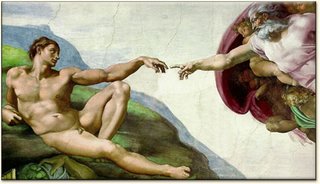
I'm already on record as a great fan of Karl Rahner, despite certain deficiencies in his understanding of the Trinity. One of the reasons for this is because of his brilliant presentation of Man's place in the cosmos, assuming an evolutionary model of humanity's origin and development (see previous entry below).
Somewhere between the intransigent young-earth creationist and the godless naturalistic evolutionist lies the much maligned and much misunderstood theistic evolutionist. To the creationist, the theistic evolutionist is a personified oxymoron trying in vain to bridge a gap between two mutually exclusive ideas. At the same time, the naturalist evolutionist pours scorn over his theistic counterpart's head on account of the latter's irrational attachment to pre-scientific myths and an outmoded worldview.
I freely admit that I am agnostic on this issue, not because I'm disinterested in it or feel it unimportant. Indeed, nothing could be further from the truth! Rather it is because I am a non-expert in the area of science who, over the years, has become increasingly and ever so confidently convinced of three things: (1) that the jury is still out; (2) that it is best to keep an open mind about such things while it is; and (3) that, no matter what verdict the jury returns, Christian theology has proven itself over and over again to be able to survive and adapt to seismic shifts in the way we understand the world around us (recall Galileo).
I have yet to come across an irrefutable creationist argument. On the other hand, I am not the least persuaded that evolutionists have made their case beyond all reasonable doubt. While I find the intelligent design theory of William Dembski et al. intriguing, if not very compelling, I can't help but observe that intellent design works just as well with an evolutionary model as it does with fiat-creationism. I think the young-earth brand of creationism is scientifically untenable, but then again, it's no more untenable than a theory of punctuated equalibrium that assumes a random universe.
However, if I did affirm theistic evolution (remember I'm agnostic on this issue) I would undoubtedly follow Rahner's version of it. He does not merely show how an evolutionary model can work within a Christian theological framework. Rather he gives a cogent account of why this model (to his mind) is superior in all respects to earlier cosmological models in its presentation of the Christian faith. I got to hand it to Rahner. Before reading him it was very convenient to dismiss theistic evolutionism as just another example of capitulation to the prevailing culture by Christians inadequately grounded in their faith.
If you're at all interested in this topic, read the entry below and feel free to make comment.
Until next time.
Tuesday, July 25, 2006
Karl Rahner's understanding of Man's place in the Cosmos within an evolutionary worldview
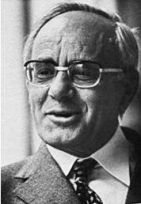
In spite of the magnificent results and perspectives of science, even the modern natural scientist, and the rest of us too who share this mentality, still remain to a large extent really imprisoned in a pre-scientific as well as a pre-philosophical and pre-theological perspective. For even today he and we along with him usually think at the unconscious and unreflexive level that it belongs precisely to the spirit of natural science to see man as a weak and incidental being who is exposed to a nature which is indifferent to him, until finally he is swallowed up again by a "blind" nature. It is only by a kind of schizophrenia that we have anything like a conception of man's dignity and abiding value and of the unique existence of each person. But the notion that man is an accidental and really unintended product of the history of nature, a caprice of nature, contradicts not only metaphysics and Christian faith, but basically it also contradicts natural science itself. If man does exist, and precisely if he is the "product" of nature, if he appears not just at any time at all, but at a definite point in this development, a point at which he himself can even direct this development at least partially by the fact that he now objectifies it and stands over against what has produced him, and transforms the producer itself, then this very nature become conscious of itself in him. But then it is directed towards him because "chance" is not a meaningful term for natural science, and the natural scientist infers from the result at least a movement directed towards it.
If we do not see it this way, then it makes no sense at all to see the history of the cosmos and that of man as a single history. But then human thought will sooner or later fall back into a platonic dualism again, for spirit will then have to feel like a stranger who is on earth by chance, and it will not allow itself for long to be disdained and abused as insignificant and powerless. If spirit is not regarded as the goal of nature itself, and if it is not seen that nature finds itself in spirit in spite of all the physical powerlessness of the individual person, then in the long run man will only be able to have validity as the disparate adversary of nature, and he will form this estimate of himself.
--Karl Rahner, Foundations of Christian Faith (1978), pp. 188-9.
The Uncertain Future of Anglicanism in a Nutshell

I'm often asked privately why I don't spend much time commenting on the present crises threatening the Anglican Communion or making predictions about the future of Anglicanism. Well, I'm about to break my relative silence with a thesis so simple that even the most the hardline "reasserter" or hard-core "reappraiser" can understand it.
My thesis is this: Both Archbishop Akinola of Nigeria and Presiding Bishop-elect Jefferts-Schori are poised and prepared to "walk apart" from the rest of the Communion, but only one of them needs to. If Akinola stands firm for the Communion then Schori and company will be forced to walk apart. If Akinola and company bolts, then Schori can rest easy. The first is a victory for Anglican catholicity; the second will effectively end the Anglican Communion experiment, which, in the eyes of many, will have proven to have been nothing more than a collection of protestant sects.
As for me, I'm content to reside in a diocese under a Windsor compliant bishop.
Saturday, July 22, 2006
The Church of Nigeria and the Anglican Communion: a dire prediction
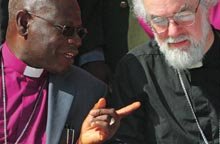
Father Jones makes a dire prediction about the designs of the Church of Nigeria over at The Anglican Centrist, and I think he may be on to something. Cruise on over to his blog for the details.
--Yet another biretta tip to Brett over at Pennsylvanian-Anglican
Friday, July 21, 2006
The Foolishness of John Hagee
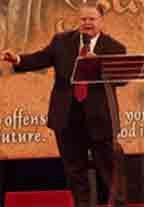
"The Jews have no greater enemy than Christian Zionists."
--Recent comment from my friend, Mark Talley
See Pastor John Hagee spearheads Christians United for Israel
Also see Israpundit
Vatican official to Anglicans: Women bishops would destroy unity
By Simon Caldwell Catholic News Service LONDON (CNS) --
A Vatican cardinal has warned the Church of England that a move to ordain women as bishops would destroy any chance of full unity with the Catholic and Orthodox churches.
Cardinal Walter Kasper, president of the Pontifical Council for Promoting Christian Unity, said that if the Church of England adopted such a resolution the "shared partaking of the one Lord's table, which we long for so earnestly, would disappear into the far and ultimately unreachable distance."
"Instead of moving toward one another, we would simply coexist alongside each other," he said.
His remarks came in a speech to a private meeting of the Church of England bishops in Market Bosworth, England, just four months after the bishops agreed to set up a working group to outline a process through which women might be consecrated as bishops.
Although three of the world's Anglican provinces have already agreed to consecrate women as bishops, Cardinal Kasper said decisions made by the Church of England had a "particular importance" because they gave a "strong indication of the direction in which the communion as a whole was heading."
Saying that he spoke with "pain and sadness," the cardinal warned the bishops of their historic decision's grave consequences, both to ecumenical relations and to the interior unity of the Anglican Communion.
Among the most serious of these, he said, would be that the goal of restoring full church communion "would realistically no longer exist" because it could not exist "without full communion in the episcopal office."
A decision in favor of women bishops made broadly by the Anglican Communion, he said, would also represent a turning away from the "common position of all the churches of the first millennium."
He said this meant that the Anglican Communion would no longer occupy "a special place" among the churches of the West but would align itself closely to the Protestant churches of the 16th century.
Cardinal Kasper said that although ecumenical dialogue would continue the loss of a common goal would "rob such encounters of their elan and their internal dynamic."
He said a further consequence of a resolution in favor of women bishops would be that the Catholic Church would inevitably continue to refuse to recognize the validity of Anglican orders.
He said that ecumenical discussions between the churches on "Apostolicae Curae," the 1896 papal bull that declared Anglican orders "absolutely null and utterly void," had "justifiably aroused promising expectations" of a change in the Catholic position. But he said that the growing practice of the ordination of women to the priesthood had since led to an "appreciable cooling" of such discussions.
The ordination of women bishops, Cardinal Kasper added, would "most certainly lower the temperature even more; in terms of the possible recognition of Anglican orders, it would lead not only to a short-lived cold, but to a serious and long-lasting chill."
Addressing the subject of the interior unity of the Anglican Communion, the cardinal said that the episcopal office was essentially one of unity and, therefore, any consecration that either caused schism or blocked the way to full unity would be intrinsically contradictory.
He criticized a proposal by the Church of England House of Bishops to remedy such divisions by allowing parishes that rejected women bishops to choose to be cared for by a male traditionalist bishop."
Where mutual recognition and communion between bishops does not exist or no longer exists, where one can therefore no longer concelebrate the Eucharist, then no church communion, at least no full church communion and thus no eucharistic communion can exist," he said. "Arrangements like those I have referred to can only cover over the breach superficially; they can paper over the cracks, but they cannot heal the division; one can even go one step further and say that, from the Catholic perspective, they are the unspoken institutionalization, manifestation and virtual legitimating of an existing schism."
Cardinal Kasper said that Pope John Paul II had made it clear that the church's position on women's ordinations "in no way rose from a denial of the equal dignity of men and women ... but is based solely on the fidelity to apostolic testimony as it has been handed down in the church throughout the centuries."
Cardinal Kasper was among a number of speakers invited to address the meeting by Anglican Archbishop Rowan Williams of Canterbury, head of the worldwide Anglican Communion.
In a statement June 6, Archbishop Williams said nothing was achieved by avoiding hard questions and that he appreciated the spirit with which the cardinal had shared his concerns."
As we consider whether women should be ordained as bishops in the Church of England and what shape any possible legislation should take, it is important to have this kind of honesty and clarity about how changes made here might impact upon the common commitments of our two communions to the search for full visible unity in Christ's church," he said.
The archbishop is scheduled to go to Rome in the fall for his second meeting with Pope Benedict XVI.
END
--Biretta tip to Bret over at Pennsylvanian-Anglican
Sunday, July 16, 2006
Blog neglect...
Until then.
Wednesday, July 12, 2006
Ephraim Radner's response to Matt Kennedy

The guys over at the Anglican Communion Institute (ACI) are absolutely brilliant. Follow this link to check out Ephraim Radner's timely and excellent response to Stand Firm's Matt Kennedy.
Monday, July 10, 2006
The Text that Luther Hated: 2 Maccabees 12:38-45

(38) Then Judas assembled his army and went to the city of Adullam. As the seventh day was coming on, they purified themselves according to the custom, and they kept the sabbath there. (39) On the next day, as by that time it had become necessary, Judas and his men went to take up the bodies of the fallen and to bring them back to lie with their kinsmen in the sepulchres of their fathers. (40) Then under the tunic of every one of the dead they found sacred tokens of the idols of Jamnia, which the law forbids the Jews to wear. And it became clear to all that this was why these men had fallen. (41) So they all blessed the ways of the Lord, the righteous Judge, who reveals the things that are hidden; (42) and they turned to prayer, beseeching that the sin which had been committed might be wholly blotted out. And the noble Judas exhorted the people to keep themselves free from sin, for they had seen with their own eyes what had happened because of the sin of those who had fallen. (43) He also took up a collection, man by man, to the amount of two thousand drachmas of silver, and sent it to Jerusalem to provide for a sin offering. In doing this he acted very well and honorably, taking account of the resurrection. (44) For if he were not expecting that those who had fallen would rise again, it would have been superfluous and foolish to pray for the dead. (45) But if he was looking to the splendid reward that is laid up for those who fall asleep in godliness, it was a holy and pious thought. Therefore he made atonement for the dead, that they might be delivered from their sin.
Aidan Nichols, O.P.: On Purgatory and Prayers for the Dead

Here are some thoughts from my favorite Roman Catholic author and theologian, Aidan Nichols, O.P. The "money statement" is in the last paragraph in bold print (emphasis mine).
In her dogmatic teaching, the Catholic Church speaks with discretion of the intermediate state. In 1979 the Congregation for the Doctrine of the Faith in its Letter on Certain Questions concerning Eschatology declared: "The Church believers there may be purification of the elect previous to the vision of God, which is nevertheless totally different from the pains of the damned." About the "place" of this purification, its duration, and its manner the teaching office of the Church falls silent, leaving the question to spiritual tradition. In that tradition we find a number of images: in the Alexandrian Fathers, Athanasius and the Cappadocians, purification by fire (where "fire" may represent the intensity of desire for God); in the Cappadocians and Ambrose of Milan, an opening of the paradise gates guarded as these are by the cherubim and the flaming sword; in Athanasius and the Desert Fathers, stages along the roads leading to heaven.
The crucial thing to note is that, in the Church's vision, the "holy souls" deserve our prayers because of their goodness. Their presence in purgatory is proof of their faith, hope, and charity. The alms Christian bestow in the cultus of the dead is par excellence charity to the poor: the holy dead are the most deserving poor of all. The souls in Thomas More's Supplycacyon put it simply: "Remember, friends, how nature and Christendom [=baptism] bindeth you to remember us." The Gaelic tradition of the western isles of Scotland calls purgatory the "Hell of the Holy Fathers," and sees Christ's people purified there
Till they are whiter the the swan of songs,
Till they are whiter than the seagull of the waves,
Till they are whiter than the snow of the peaks,
And whiter than the white love of the heroes.
The Protestant rejection of purgatory (and prayer for the dead) is seen by Catholicism as based on a mistaken interpretation of the mediation of Christ. Christ's mediation of human salvation is indeed unique and all-sufficient, but it is not separated from the prayer of his Church. The head and the body are one, and the head's glory as Savior is the greater in that he encourages the body to share in the communication to the whole human mass of the effects of his redeeming work. What the Lord has done for us in his mighty salvation he grants to us to do ourselves. The continuum of life in Christ is more primary than the biological continuum. As sharers, in via, of the life of Christ who called himself "the way," we (super)naturally wish both to pray for the holy souls and to seek their prayers.
--Aidan Nichols, Epiphany: A Theological Introduction to Catholicism (Liturgical Press, 1996), pp. 197-8.
Until next time.
P.S. That I describe Nichols, a Dominican, as "my favorite Roman Catholic author and theologian," demonstrates that, yes, I do think one can occasionally learn something from a Thomist.
Wednesday, July 05, 2006
Karl Rahner on the Holy Trinity

Alright, I confess: I like Karl Rahner. He is difficult to read, even exasperating at times. I can only take him in small doses, but he makes me think even though I often find myself at variance with him. The way I see it he's worth the effort if only for the fact that he is perhaps the most important Roman theologian of the 20th century.
In particular I am attracted to Rahner's concept of human transcendence and how this relates to the Incarnation. But recently, in light of the discussions on this blog, I decided to review what he had to say about the Trinity in his monumental Foundations of Christian Faith (English translation, 1978). While I can't say that I was totally surprised to find elements of modalism in his understanding of the Trinity (after all, he is cut out of the same western Augustinian cloth), I will admit that I was shocked to see how blatent his modalism was. The following is an example of what I mean. What do you think?
Insofar as he has come as the salvation which divinizes us in the innermost center of the existence of the individual person, we call him really and truly "Holy Spirit" or "Holy Ghost." Insofar as in the concrete historicity of our existence one and the same God strictly as himself is present for us in Jesus Christ, and in himself, not in a representation, we call him "Logos" or the Son in an absolute sense. Insofar as this very God, who comes to us as Spirit and Logos, is and always remains the ineffable and holy mystery, the incomprensible ground and origin of his coming in the Son and in the Spirit, we call him the one God, the Father. Insofar as in the Spirit, in the Logos-Son, and in the Father we are dealing with a God who gives himself in the strictest sense, and not something else, not something different from himself, we must say in the strictest sense and equally of the Spirit, of the Logos-Son and of the Father that they are one and the same God in the unlimited fullness of the one Godhead and in possession of one and the same divine essence.
--Foundations of Christian Faith, p. 136.
Prayers for the Dead
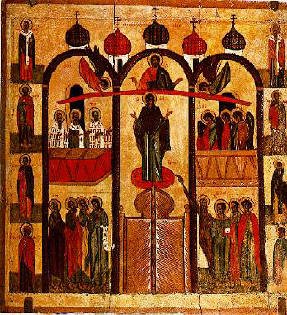
I'm soon to share my thoughts and embark on a discussion of the Christian practice of praying for the dead. To prime the pump, so to speak, I've included the Catechism question from the '79 BCP on the subject below.
If you're curious as to what my approach will be, I encourage you to read my earlier thoughts on the somwhat related issue of the Invocation of the Saints, which can be accessed here, here, and here.
Until then...
Q. Why do we pray for the dead?
A. We pray for them, because we still hold them in our love, and because we trust that in God's presence those who have chosen to serve him will grow in his love, until they see him as he is. (Catechism of the 1979 Book of Common Prayer)
Tuesday, July 04, 2006
Check out Trinitarian Life
Monday, July 03, 2006
Check out Thomas' Blog
Check it out HERE.
Saturday, July 01, 2006
Gerald Bray "Gets It": His Discussion of Thomas Aquinas
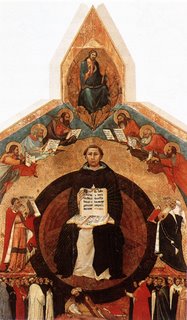
Aquinas' debts to Augustine and Anselm are obvious, but he was determined to go beyond them and establish a clear distinction between the two divine 'processions', generation and procession (in the classical sense). 'Generation' was defined by Aquinas as an (intellectual) act of conception which produced its like, i.e. the Father reproduced his own likeness in the Son. 'Procession' he defined as an impulse of the divine will, which brings forth something other than a straightforward reproduction of itself. When this impulse is perfect, as it must be within the Godhead, the resulting product will also be fully God. Hence there is a real difference between the Son and the Holy Spirit, both of whom are fully God, although once again the Spirit fits only somewhat uncomfortably into what is basically an Augustinian model of the Trinity.
Not content to stop there, Aquinas used the terms 'paternity', 'filiation' and 'procession' to describe the divine relations. He distinguished them from the essence of God by saying that the former are relative, while the latter is absolute. His abstractions differ from those of the Cappadocians, for whom unbegottenness, begottenness and procession were the absolute distinctions of the hypostases. But like them, he has succumbed to a tendency towards philosophical abstraction which is very different from the spirit of the New Testament. The full effect can be seen in Thomas' definition of the word 'person'. As far as he was concerned, person was an aspect of a nature which signified what was distinct in that nature. Because distinction in God is only by relations of origin, a divine person is defined by Aquinas as a subsistent relation in the being of God. In other words, 'person' and 'relation' are synonymous, which means that one might easily dispose of the unphilosophical term 'person' and speak only of (Aristotelian) relations in God.
The trinitarianism of Anselm and Aquinas can rightly be criticized for being too philosophical, too abstract, and even reactionary, in the sense that it is dependent on the primacy of nature over person -- almost inevitable in any philosophical theology, but directly counter to the spirit of Chalcedonian christology. Unfortunately, christology and trinitarian theology tended to go their separate ways during the high Middle Ages, and they are still not always closely linked even today.
--Gerald Bray, The Doctrine of God (IVP, 1993), pp. 182-3
